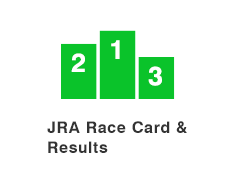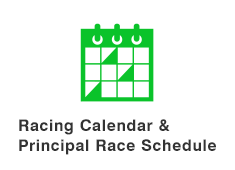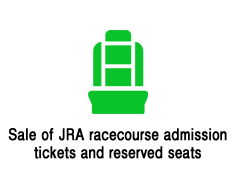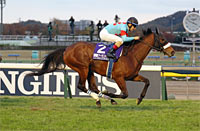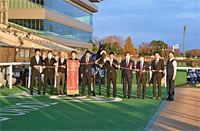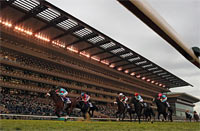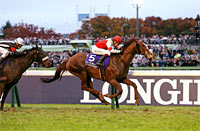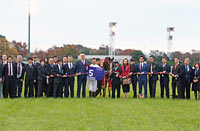2019 News
Japan Cup (G1) - Handicapper's Report on the Japanese Contenders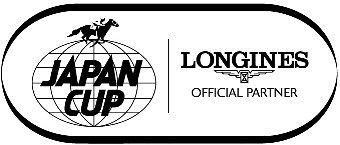 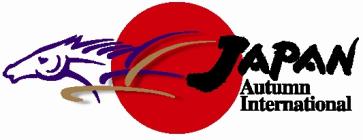 The Japan Cup (G1, 2,400m) title has been dominated by our own Japanese runners for the last 13 years while the number of foreign participants in the invitational G1 event has decreased each year and finally coming to none competing for the title this year. The reason for the declining number of visiting contestants is believed to come with the increasing standard of racing in Japan, especially in the middle-long distance category, and Japanese thoroughbreds have shown their quality with successes abroad, such was the case in Australia last month where Japanese runners took home two major G1 titles, the Caulfield Cup and the Cox Plate over two consecutive weeks – gaining more recognition that our Japanese horses are becoming increasingly hard to beat. And there are other factors, for example, the climate, environment and adapting to the fast track that needs to be taken into consideration and could discourage some into taking the trip over. However, there have been horses from overseas that thrived in Japan such as British-trained filly Snow Fairy (IRE, by Intikhab) who conquered the top female Japanese runners twice with her tremendous speed, winning back-to-back titles in the Queen Elizabeth II Commemorative Cup (G1, 2,200m) in 2010 and 2011. So there are without doubt horses that can make use of their abilities on tracks like ours and we wait with great anticipation for more foreign runners like Snow Fairy to bring excitement to our Japanese racing fans in the near future. The all-Japanese field this year, as of the first-round declaration, included six G1 winners including three Derby winners, equaling the number of last year’s field. However, Loves Only You (JPN, F3, by Deep Impact), winner of this year’s Yushun Himba (Japanese Oaks, G1, 2,400m), has already chosen to run in the Hong Kong Vase (G1, 2,400m) instead and the remaining five have not won a G1 title this season. Moreover, the top finishers of the Tenno Sho (Autumn) (G1, 2,000m), that have played a starring role in the Japan Cup for most years, will not be present this year as the reigning Horse of the Year and this year’s Tenno Sho (Autumn) victor Almond Eye (JPN, F4, by Lord Kanaloa), along with the following two finishers in the race, have withdrawn their entry which leaves the Japan Cup race wide open. The following are among those that have a good chance of becoming the winner this year. The two that demonstrated impressive turn of speed in their respective fourth and fifth-place finishes against this year’s strong field that included 10 G1 winners in the Tenno Sho (Autumn) were You Can Smile (JPN, C4, by King Kamehameha) and Wagnerian (JPN, C4, by Deep Impact). Both four-year-olds share the same owner and trainer and are at an age in which past data shows have the best strike rate of claiming the Japan Cup title. You Can Smile, although no match to the winner Almond Eye in the Tenno Sho (Autumn), closed in with powerful speed from the rear that registered the fastest finish (3F) to cross the wire just neck-and-neck behind the runner-up. A stayer with stamina and a grade-race title at 3,400 meters, his next G1 challenge that is 400 meters longer than the Tenno Sho (Autumn) should be an advantage, adding to the fact that his two career grade-race victories were going left-handed. The King Kamehameha colt has been consistent while winless in his past G1 challenges, finishing third, fifth and fourth, so the Japan Cup makes for an ideal race for the colt to aim for his first G1 title. You Can Smile is rated 117I as of his fourth-place finish in the Tenno Sho (Autumn). Wagnerian, last year’s Derby winner, was also reserved off the pace in the Tenno Sho (Autumn) and made up ground rapidly, registering the third fastest finish (3F) after You Can Smile and Almond Eye, to finish a neck behind his stablemate in fifth. He has been consistent in his three starts this season, all at 2,000 meters, and has won two out of as many career starts at 2,400 meters including his Tokyo Yushun (Japanese Derby, G1, 2,400m) victory, so the extra distance should be again an advantage. His races were spaced since the fall of his three-year-old season due to conditioning setbacks, but he appears well recovered and improving in his form for the Japan Cup challenge. He was rated 117I after all three starts this year in which he was third in the Osaka Hai (G1, 2,000m), fourth in the Sapporo Kinen (G2, 2,000m) and fifth in the Tenno Sho (Autumn). The following three five-year-old and up horses are proven G1 winners although none have won a G1 title this season. Rey de Oro (JPN, H5, by King Kamehameha) won the 2017 Tokyo Yushun and continued into his four-year-old campaign with another G1 victory in the Tenno Sho (Autumn) and a runner-up effort in the Arima Kinen (The Grand Prix)(G1, 2,500m), concluding the season, second only to Almond Eye, in rankings at 123I. He tops the 2019 Japan Cup field in past performances but has been unable to bounce back to form in two starts since his unsuccessful overseas challenge in Dubai. The key success factor would be that he has proven well suited to the 2,400m course at Tokyo – he has won the Derby and runner-up in the Japan Cup – and that he has turned in good results between October and December during which he has registered four wins and two seconds out of six starts (the two runner-ups were in the Japan Cup and the Arima Kinen), so hopes are high for the talented son of King Kamehameha to turn in his best performance in the coming Japan Cup. His best rating of this year is 115L as of his fourth-place finish in the All Comers (G2, 2,200m). Cheval Grand (JPN, H7, by Heart’s Cry) is the Japan Cup champion of 2017. There are three G1 races held by the JRA for older colts and horses that are of distances 2,400 meters and beyond, and the son of Heart’s Cry has started in all of them for the past three years, having turned in consistent results; two seconds and a third in the Tenno Sho (Spring) (G1, 3,200m), a win, a third and a fourth in the Japan Cup and two thirds and a sixth in the Arima Kinen. Cheval Grand was raced overseas for most of this year and, while he was unable to show his best in the U.K., he finished second, the best among the Japanese runners that included Rey de Oro and Suave Richard, in the Dubai Sheema Classic (G1, 2,410m). The Japan Cup will be his first comeback start since returning to Japan in August, but Christophe Soumillon, who will be taking the reins this year, could bring out the best performance from the former Japan Cup champion. His best rating this year is 119L as of his runner-up effort in the Dubai Sheema Classic. 2018 Osaka Hai winner Suave Richard (JPN, H5, by Heart’s Cry) follows the same racing program as last year in which he came off a 10th-place finish in the Tenno Sho (Autumn) and was third in the Japan Cup. He was slow to respond in his first start from a summer break and was defeated to seventh in this year’s Tenno Sho (Autumn) but, as was the case last year, he has the ability to close in and be a powerful threat, especially if Oisin Murphy, his partner for the first time, can bring out his lasting speed that is his key to success in the coming Japan Cup. His rating 118L is as of his third-place finish in the Dubai Sheema Classic. The lone three-year-old filly slated to run in the Japan Cup this year is Oaks runner-up Curren Bouquetd’or (JPN, F3, by Deep Impact). Attention focuses on whether she will succeed Almond Eye as the next three-year-old female Japan Cup champion. Curren Bouquetd’or has yet to win a grade-race title, but the runner-up in both the Yushun Himba (Japanese Oaks) and the Shuka Sho (G1, 2,000m) counts her among the top class fillies of her generation. Especially worth taking note is her performance in the Oaks where she kept close to a rapid pace, took command early and stayed well before giving way grudgingly in the race whose winning time was renewed by 0.8 seconds and timed at 2:22.8 over the 2,400-meter distance. The decision made by her connections to choose the Japan Cup instead of the traditional filly/mare championship race, the Queen Elizabeth II Cup (G1, 2,200m), is considered to be based upon her suitability to the 2,400m course at Tokyo as well as the weight advantage of 53kg for three-year-old fillies. The Deep Impact filly with her versatility and lasting speed has a good chance of joining the top finishers. Her rating of 112L is as of her runner-up effort in the Yushun Himba. |
|






